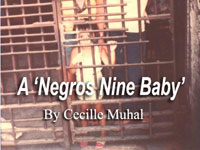A ‘Negros Nine Baby’
By Cecille Muhal
The author is a nurse working in Cebu.

While my father stayed in jail, my mother left my younger sister in the care of my grandparents while I lived in the home of a close family friend. Each visit to the jail was a reunion for my family, like a vacation to be looked forward to.
There was a time when I got to stay in the jail for almost a week, though I didn’t know why I was allowed to, and experience life in prison first-hand. My father and I would sleep in a small wooden bed at the corner of the cell where walls were covered with newspaper. There was a small bedside table with some reading material. Our clothes were inside a bag placed under the bed. In the morning, we would share the food rationed by the jail management and my father would help me take a bath in a small comfort room-cum-washing area. Then, he would let me play or have a chat with other prisoners, guards, vendors and visitors. I made a lot of friends and even got a miniature boat placed inside a bottle with the inscription M/V Cecilia from one of the prisoners as a souvenir.
Tatay would tell stories for me to sleep at night and having a bed was a little ‘luxury’ as others had only a banig (local woven mat) on the floor on which to sleep. When people came to visit, my father would ask me to sing and dance for them, which I enjoyed very much. My uncle even bought a cassette player for a greater effect. I even got a prize if lucky. Sundays were special too as Mass was celebrated in the open grounds of the jail. I got to mingle with a lot of prisoners and their visiting families and it brought me into a deep connection with them and their predicament. In fact, when I was an undergraduate in BS Nursing, our group made a descriptive study on the common health problems and medical services available among the inmates of Negros Occidental Provincial Jail in Bacolod City, the same jail where my father had been imprisoned. I believe that medical attention should be given even to the outcasts of society, and not only within the confines of the hospital. I hope that our collected recommendations were taken into consideration by the jail’s management.
The experience of being locked in the cell made me realize and appreciate the value of freedom and how every visit of a loved one or of a friend was treasured, how every word of encouragement brought hope, how food being shared gave strength to face yet another day of the battle for justice for the lives of those in prison. It also made me and my family stronger. The separation and struggles made us closer and helped us value the times we spent together.
The things my father fought for and the principles he believed in still remain these many years after his release and that of his companions with the institution of Negros Nine Human Development Foundation, Inc. headed by Father Brian Gore together with the remaining living members of the Negros Nine and others who believe in their ideals.
Though my father left us early due to cancer in 1990, I get to see how he lived through the stories of people whose lives he touched and whom he inspired. I can never be more proud of being his daughter and a ‘Negros Nine baby’.
You may email the author at cecille_muhal@yahoo.com